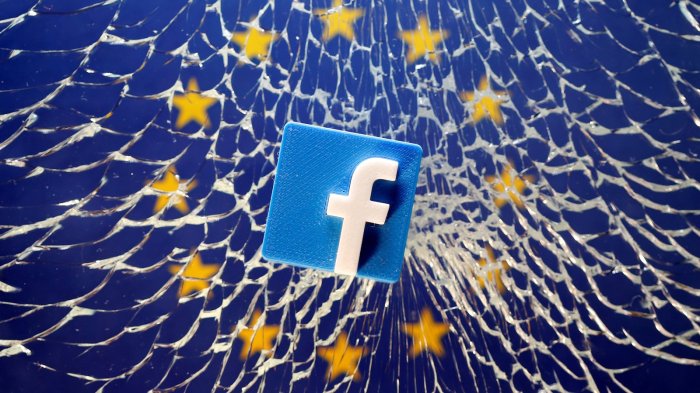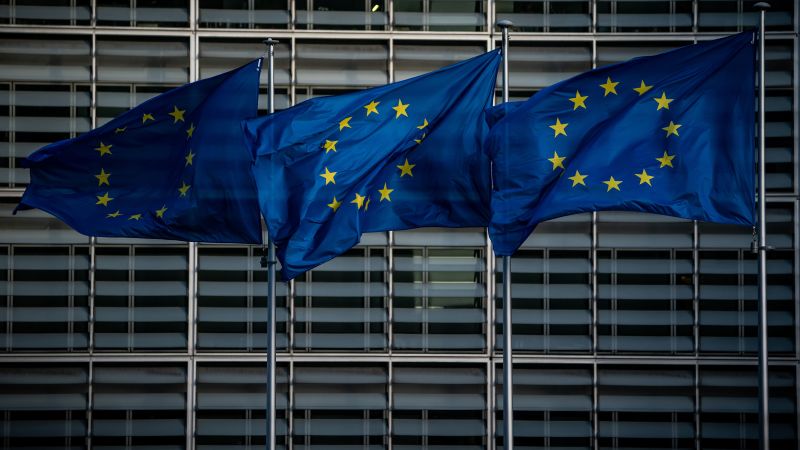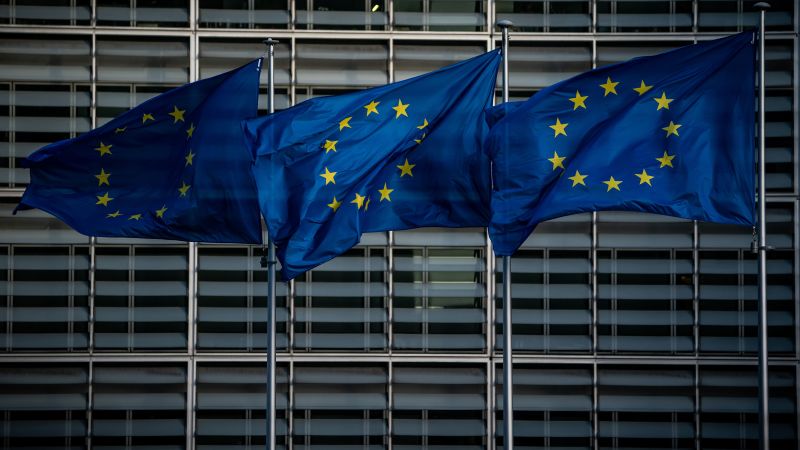The EU wants government action against disinformation, and it’s a move that’s sparking debate across the continent. The issue of fake news and manipulated information has become increasingly prevalent, impacting everything from political elections to public health. The EU is worried, and they’re proposing some significant steps to tackle this problem.
From social media platforms to traditional news outlets, disinformation can spread like wildfire, often with harmful consequences. The EU is particularly concerned about the spread of misinformation related to sensitive topics like elections, public health, and the economy. These campaigns can undermine trust in institutions, sow discord, and even incite violence.
The EU’s Concerns
The European Union (EU) has expressed significant concerns about the spread of disinformation, particularly in the context of its impact on democratic processes, public trust, and the overall well-being of its citizens. The EU recognizes the potential of disinformation to undermine democratic values, sow discord, and influence public opinion in harmful ways.
Types of Disinformation
The EU is particularly concerned about disinformation campaigns targeting key areas, including:
- Political Disinformation:This involves spreading false or misleading information about elections, political candidates, or government policies. It aims to manipulate public opinion and influence electoral outcomes.
- Health Disinformation:This type of disinformation focuses on spreading false or misleading information about health issues, diseases, and treatments.
It can lead to public health risks and undermine trust in healthcare professionals.
- Economic Disinformation:This involves spreading false or misleading information about economic indicators, market trends, or financial institutions. It can manipulate markets, damage businesses, and create economic instability.
- Social Disinformation:This encompasses spreading false or misleading information about social issues, such as immigration, race relations, or gender equality.
It can exacerbate social divisions and undermine social cohesion.
Recent Disinformation Campaigns
Several recent disinformation campaigns have impacted the EU, demonstrating the growing threat posed by this phenomenon. Some notable examples include:
- The 2016 US Presidential Election:While not directly targeting the EU, the widespread use of disinformation during the 2016 US presidential election highlighted the potential for foreign interference in democratic processes.
- The 2017 French Presidential Election:Russian-linked disinformation campaigns aimed to influence the 2017 French presidential election by spreading false information about candidates and the election process.
- The COVID-19 Pandemic:The COVID-19 pandemic saw a surge in disinformation campaigns spreading false information about the virus, its origins, and potential treatments. This disinformation led to public health risks and hampered efforts to contain the pandemic.
Proposed Actions

The EU is taking a multi-pronged approach to combat disinformation, focusing on a combination of regulatory measures, collaborative initiatives, and public awareness campaigns. These actions are designed to address the various aspects of disinformation, from its creation and spread to its impact on individuals and society.
Measures Targeting Online Platforms
The EU aims to hold online platforms accountable for the spread of disinformation on their platforms. These measures are designed to increase transparency, promote accountability, and encourage proactive efforts to combat disinformation.
- Code of Practice on Disinformation:The EU has developed a voluntary Code of Practice on Disinformation, which encourages online platforms to take proactive measures to combat disinformation on their platforms. This code Artikels principles for identifying and removing disinformation, promoting media literacy, and collaborating with fact-checkers.
While voluntary, platforms that fail to comply could face significant fines.
- Digital Services Act (DSA):The DSA, which is expected to be implemented in 2024, introduces new obligations for online platforms, including those related to disinformation. The DSA requires large online platforms to conduct risk assessments, implement measures to mitigate risks, and cooperate with authorities in addressing disinformation.
It also includes provisions for the removal of illegal content, including disinformation that incites violence or hatred.
- Transparency and Accountability:The EU is also proposing measures to increase transparency and accountability in online advertising. This includes requiring platforms to disclose the source of political advertising and to provide information about the algorithms used to target advertising. These measures aim to prevent the use of targeted advertising to spread disinformation and to empower users with more information about the content they encounter.
Measures Supporting Media Literacy and Critical Thinking
The EU recognizes that combating disinformation requires equipping individuals with the skills and knowledge to critically evaluate information and identify disinformation. These measures aim to promote media literacy and critical thinking skills among citizens, empowering them to navigate the digital information landscape effectively.
- Public Awareness Campaigns:The EU is funding public awareness campaigns to educate citizens about disinformation, its impact, and how to identify and avoid it. These campaigns often utilize social media, traditional media, and educational programs to reach diverse audiences.
- Media Literacy Education:The EU is encouraging the integration of media literacy education into school curricula. This aims to equip younger generations with the skills to critically evaluate information, identify disinformation, and engage responsibly with online content.
- Support for Fact-Checkers:The EU provides funding and support to independent fact-checking organizations. Fact-checkers play a crucial role in identifying and debunking disinformation, providing accurate information to the public. This support aims to strengthen the credibility and reach of fact-checking efforts.
Measures Addressing the Spread of Disinformation
The EU is taking steps to address the spread of disinformation, focusing on the identification and removal of harmful content, and the promotion of responsible information sharing.
- Collaboration with Researchers and Experts:The EU collaborates with researchers and experts in the field of disinformation to understand its dynamics, identify emerging trends, and develop effective countermeasures. This collaboration helps to inform policy decisions and to develop evidence-based strategies for combating disinformation.
- Cooperation with Member States:The EU works closely with member states to coordinate efforts and share best practices in combating disinformation. This includes sharing information about emerging threats, coordinating responses to disinformation campaigns, and promoting cross-border collaboration.
- International Cooperation:The EU recognizes the global nature of disinformation and engages in international cooperation with other countries and organizations to address this challenge. This includes collaborating with international partners on initiatives to combat disinformation, share information about emerging threats, and develop common standards for tackling disinformation.
Comparison with Existing Measures in Other Countries
The EU’s approach to combating disinformation is similar to measures taken by other countries, but with a focus on the digital environment and the role of online platforms. For example, the US has implemented legislation such as the Foreign Agents Registration Act (FARA) and the Honest Ads Act, which aim to increase transparency in political advertising and to combat foreign interference in elections.
Australia has introduced a code of practice for online platforms that addresses disinformation, similar to the EU’s Code of Practice. However, the EU’s approach stands out with its emphasis on a multi-pronged strategy that encompasses regulatory measures, collaborative initiatives, and public awareness campaigns.
Potential Impacts

The EU’s proposed actions to combat disinformation carry significant potential impacts, both positive and negative. These impacts are multifaceted and deserve careful consideration. While the aim is to foster a more informed and trustworthy online environment, it’s crucial to weigh the potential benefits against the potential risks.
Potential Positive Impacts
The EU’s proposed actions could bring about several positive impacts, contributing to a healthier online ecosystem.
- Increased Trust in Information:By combating disinformation, the EU aims to enhance public trust in online information. This can be achieved by making it more difficult for false or misleading content to spread widely, leading to a more reliable and trustworthy online environment.
For instance, if platforms are held accountable for the spread of disinformation, users might be more inclined to trust the information they encounter online.
- Reduced Polarization:Disinformation often contributes to societal polarization by fueling echo chambers and reinforcing existing biases. The EU’s actions could help mitigate this by limiting the reach of divisive content and promoting more balanced perspectives. This could lead to more constructive public discourse and a greater sense of shared understanding across different viewpoints.
- Improved Media Literacy:The EU’s proposed measures might encourage individuals to develop greater media literacy skills. This could involve promoting critical thinking, fact-checking, and source evaluation, empowering users to discern reliable information from disinformation.
Potential Negative Impacts
While the EU’s intentions are commendable, there are also potential negative impacts associated with its proposed actions.
- Censorship Concerns:One major concern is the potential for censorship. The EU’s measures could be interpreted as restricting freedom of expression, particularly if they are implemented in a way that limits the dissemination of legitimate viewpoints or dissenting opinions. Striking a balance between combating disinformation and protecting freedom of speech is crucial.
- Restrictions on Free Speech:The EU’s proposed actions could lead to over-regulation, inadvertently restricting free speech. This could stifle diverse opinions and perspectives, leading to a less vibrant and open online environment.
- Chilling Effect on Innovation:The EU’s actions could create a chilling effect on innovation, particularly for startups and smaller platforms. The fear of being penalized for disinformation could discourage them from experimenting with new content formats or platforms, hindering the development of new online tools and services.
Browse the multiple elements of meta leads uk payment scams uk finace claims to gain a more broad understanding.
Comparison of Potential Benefits and Drawbacks, Eu wants government action against disinformation
| Potential Benefits | Potential Drawbacks |
|---|---|
| Increased trust in information | Censorship concerns |
| Reduced polarization | Restrictions on free speech |
| Improved media literacy | Chilling effect on innovation |
International Collaboration: Eu Wants Government Action Against Disinformation

The fight against disinformation is a global challenge that requires a coordinated and collaborative response. No single country or organization can effectively tackle this issue alone. International collaboration is essential for sharing best practices, coordinating efforts, and leveraging resources to combat the spread of false and misleading information.
Existing International Initiatives
International collaboration in combating disinformation has been growing, with numerous initiatives emerging in recent years. These initiatives aim to promote information literacy, strengthen media resilience, and foster cooperation between governments, civil society organizations, and technology companies.
- The Global Forum on Digital Cooperation (GFDC): This multi-stakeholder forum, launched in 2019, brings together governments, international organizations, civil society, and the private sector to address the challenges of the digital age, including disinformation. The GFDC has established working groups on issues like online safety, digital trust, and the governance of artificial intelligence, which all have implications for combating disinformation.
- The European Union’s Action Plan against Disinformation: This plan, launched in 2018, Artikels a comprehensive strategy for tackling disinformation within the EU. It includes measures to promote media literacy, strengthen the resilience of online platforms, and enhance cooperation with international partners. The EU has also established a Rapid Alert System for Disinformation (RASD) to monitor and share information about disinformation campaigns.
- The Global Network on Extremism and Technology (GNET): This network, launched in 2017, brings together governments, technology companies, and civil society organizations to combat online extremism and terrorism. GNET provides a platform for information sharing and collaboration on strategies to counter the spread of extremist content online, which often overlaps with disinformation campaigns.
| Initiative | Goals | Participants | Key Achievements |
|---|---|---|---|
| Global Forum on Digital Cooperation (GFDC) | Address challenges of the digital age, including disinformation | Governments, international organizations, civil society, and the private sector | Establishment of working groups on online safety, digital trust, and the governance of artificial intelligence |
| European Union’s Action Plan against Disinformation | Tackle disinformation within the EU | EU member states, international organizations, technology companies, and civil society | Promotion of media literacy, strengthening of online platforms, and establishment of the Rapid Alert System for Disinformation (RASD) |
| Global Network on Extremism and Technology (GNET) | Combat online extremism and terrorism | Governments, technology companies, and civil society organizations | Platform for information sharing and collaboration on strategies to counter the spread of extremist content online |
Challenges and Opportunities
The EU’s ambitious efforts to combat disinformation face a complex web of challenges and opportunities. While the proposed actions hold great promise, their implementation requires careful consideration of potential obstacles and the exploration of innovative approaches.
Challenges in Implementing EU Actions
The EU faces several challenges in effectively implementing its proposed actions against disinformation. These challenges stem from the multifaceted nature of the problem, the complexity of online environments, and the need for international cooperation.
- Defining and Identifying Disinformation:Disinformation can take many forms, making it difficult to define and identify. This ambiguity can lead to unintended consequences, such as censorship or the suppression of legitimate speech.
- Attributing Responsibility:Tracing disinformation back to its source and assigning responsibility can be challenging. The anonymous nature of the internet and the use of bots and automated accounts further complicate the process.
- Enforcing Regulations:The global nature of the internet makes it difficult to enforce regulations across borders. Platforms and individuals may operate outside the jurisdiction of EU laws, limiting the effectiveness of enforcement measures.
- Balancing Freedom of Expression:Combating disinformation must be balanced with the fundamental right to freedom of expression. Striking the right balance is crucial to avoid overly restrictive measures that could stifle legitimate debate and dissent.
- Public Trust and Engagement:The effectiveness of any anti-disinformation strategy depends on public trust and engagement. Building trust in institutions and promoting media literacy are essential to empower citizens to critically evaluate information.
Opportunities for More Effective Strategies
Despite the challenges, the EU has opportunities to develop more effective strategies for combating disinformation. These opportunities lie in leveraging technology, fostering collaboration, and promoting media literacy.
- Technological Solutions:Advances in artificial intelligence (AI) and machine learning can be used to detect and flag disinformation more effectively. This includes developing algorithms that can identify patterns of manipulation and automated accounts.
- Cross-Border Cooperation:The EU must strengthen cooperation with other countries and international organizations to address the global nature of disinformation. This includes sharing information, coordinating regulatory frameworks, and developing joint initiatives.
- Media Literacy Education:Investing in media literacy education is crucial to empower citizens to critically evaluate information and identify disinformation. This can include programs that teach critical thinking skills, media analysis techniques, and how to verify information sources.
- Collaboration with Platforms:Working closely with social media platforms is essential to address the spread of disinformation. This includes encouraging platforms to implement stronger content moderation policies, provide transparency about algorithms, and develop tools for users to report disinformation.
- Supporting Independent Journalism:Strengthening independent journalism is essential to provide reliable information and counter the spread of disinformation. This can include providing financial support to independent media outlets and promoting ethical journalism practices.





